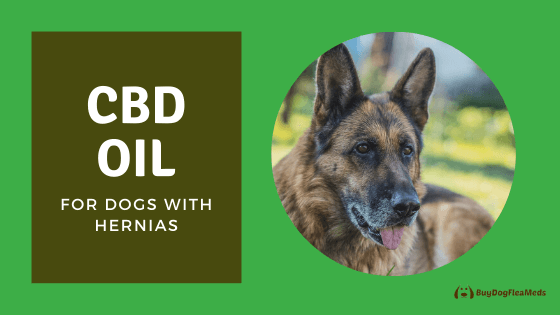CBD Oil for Dogs With Hernias
Do you know, like humans, dogs can also adopt hernia? This is indeed a painful experience for them. Is dog Hernia harmful? Can it be fatal? What are the symptoms and how to treat it? Check out this post and get to know more!!
What’s Dog Hernia?
Dogs’ hernia is quite common and it’s often seen in puppies. A dog hernia is a condition in which the materials of the abdomen of the dog pushes over a tear or muscle hole wall. This gives birth to fatty tissues. A hernia is usually a genetic disorder. However, sometimes it occurs due to trauma as well. The fatality of this disorder depends on its location on the dog’s body.
Different types of Hernia in Dogs
There are five types of dog hernia. Below are the classifications.
Umbilical Hernia
Bulldogs, Shih-Tzu, Weimar, and Pekingese are known to be risk dogs, but any puppy can be affected by this type of hernias. A kind of small joint is found in the belly, at the level of the navel.
It is a fairly common dog hernia and it is so for good reason! It is usually linked to poor closure of the muscular wall in the place where the umbilical cord passed, or to excessive traction of the cord while giving birth.
The consequence is a kind of small “hole” in the muscular wall, through which fat or a portion of the intestine can be swallowed (less problematic situation).
While pressing, the hernia seems to disappear (it is reducible) and as long as it does, simple monitoring is sufficient. But if the hernia changes its appearance (if it becomes enlarged or if it becomes red and ulcerated or is no longer reducible), emergency surgery should be performed.
To avoid this situation, veterinarians prefer to operate “cold” on the occasion of anesthesia for another operation, such as sterilization.
Can we prevent it?
Experienced veterinarians know how to cut the umbilical cord to limit this risk, but it is not enough to prevent other causes. The best thing to do when adopting a puppy is to verify that there is no suspicious “ball” in the navel.
Inguinal Hernia
Inguinal hernia is a quite uncommon dog hernia, it does not occur very often in dogs. Generally, it is a soft mass, which does not cause pain.
It’s located between the inner part of the thigh and the abdomen, which gives the alert. It corresponds to the abnormal passage of the organs from the abdomen through an opening that is generally used only for the vessels and ligaments that pass.
What is the solution for the inguinal hernia of dogs?
It is necessary to operate because the risk is twofold- either the uterus passes into the sac of the hernia (with the risk of complication in case of future pregnancy) or a piece of intestine is stuck. In the latter case, severe abdominal pain and vomiting may occur. It is usually a sign of a strangulated hernia. It is a surgical emergency.
Can it be prevented?
An inguinal dog hernia can’t be prevented, but complications can be avoided by operating the animal before it occurs. Apart from emergency situations, inguinal hernia surgery poses no problem.
Perineal Hernia
Non-sterile male dogs that have prostate problems or chronic constipation problems are mainly concerned. This type of hernia is easily identifiable by the appearance of a type of painless swelling next to the anus (which shows the weakness of the muscles at this level) and by efforts or difficulties in the emission of faces.
Sometimes there is only abdominal and rectum fat in this dog hernia, but sometimes the prostate and bladder follow. The swelling can become significant, causing a tail deviation.
Intense and repeated defecation efforts, as well as weakness of the perineal muscles, eventually lead to the appearance of a hernia between the anus and the genitals.
It is then a vicious circle because perinea hernia, in turn, promotes constipation. This type of hernia should not be allowed to develop because it can get complicated quickly, especially if the bladder is included in the hernia. It carries the risk of acute renal failure and prevents the dog from urinating. The only solution is to operate it quickly.
Diaphragmatic Hernia
This type of hernia is noticed when the liver and stomach passes through the chest cavity through a hole, where the lungs are located. It leads to shortness and difficulty of breathing. Unfortunately, there are no preventive measures that one can take to keep his/her dog away from this type of hernia.
Hiatal Hernia
This develops when the stomach enters the esophagus area through a whole. It is seen in the meeting point of the stomach and esophagus. The esophagus pushes in the stomach and the contents and stomach push into the diaphragm. The only prevention is, stop your dog from overeating.
Symptoms of Hernia in Dogs
Often, dogs show simply no symptoms while developing a hernia. However, depending on the severity of the same, the signals can look life-threatening! In general, a hernia can look like a soft, bubble-shaped mass.
Other symptoms include-
- Drooling
- Cramping
- Fever
- Difficulty in breathing
- Lethargy
- Coughing
- Nausea and vomiting water or food.
Hernia in dogs Survival Rate
As per the statistics, around 15% of dogs in the U.S suffer from a hernia. If treated successfully, the recovery rate is around 11-14%. So, there’s no need to worry if you start rendering the treatment before it’s too late.
Dogs hernia natural home remedies
Do we know that dog hernia can be treated with the help of natural home remedies? Yes!! It might sound surprising but it’s true!!
With a natural ingredient like CBD oil, you can help in easing their discomfort and help your furry friend to get relief from a hernia. It acts as same as the surgical methods, but the good part is, it doesn’t carry the adverse effects like pain, rupture of the incision and infection that occurs after a surgical procedure.
The right dose of CBD can help in healing the tears or holes that cause a hernia. It helps your dog to cure fast and avoid the painful experience of the surgical procedure.
How much CBD should I give my dogs with a hernia
The ideal dose is, 1-5 mg for every 10 pounds of the body weight. If the pain is severe, you should give it every 8 hours. When the situation is controlled, you can give it twice a day.
References
- Björck, G. R., & Tigerschiöld, A. (2008, September 23). Peritoneal‐pericardial diaphragmatic hernia in a dog. Retrieved from https://onlinelibrary.wiley.com/doi/abs/10.1111/j.1748-5827.1970.tb05619.x
- Small Animal Topics. (n.d.). Retrieved from https://www.acvs.org/small-animal/diaphragmatic-hernia.
CBD Doses for Dogs or Cats. (n.d.). Retrieved from https://www.allthebestpetcare.com/pet-nutrition/cbd-dose-dog-cat/
CBD for dogs information
have a very easy website home
flea pills
nexgard reviews
Bravecto for Cats
cbd treats for dogs
cbd treats for cats

